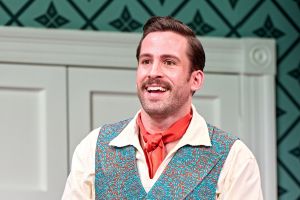Brief Encounter with Philip Meeks
The writer discusses Harrogate Theatre’s first new play commission for 20 years

On 10 December Harrogate Theatre stages the opening night of Edith in the Dark, the first new play that the theatre has commissioned in its own right for 20 years. In recent years, Harrogate's policy of supporting and collaborating with touring companies linked to the theatre has borne rich fruit, but this time the home theatre is in sole charge.
Philip Meeks describes the process by which he came to be commissioned to write Edith in the Dark. The theatre has a penchant for staging ghostly tales in the Studio to complement the pantomime and he was approached to produce a home-grown version. Convinced that he could do better than repeat the perennial M.R. James, he decided to investigate ghost stories by female writers, an important and neglected part of the canon. And that's when he found Edith Nesbit!
Thinking The Railway Children and The Treasure Seekers? Think again! In her early years as a writer, E. Nesbit turned her hand to many forms of fiction, including four volumes of ghost/horror stories, three of them published in the 1890s before her first success with The Treasure Seekers. Meeks describes her stories as "scary and not at all genteel", with no hint of the dashing man rescuing the damsel in distress in the closing pages that characterised some other female authors of tales of horror. Furthermore, given her friendship with H.G. Wells, a science fiction element is hardly surprising.
With these stories one element of Edith in the Dark was in place. A second element is Edith Nesbit's unhappy, almost tragic life. Her many sad or terrifying experiences included the death of her teenage son in an operation to remove his tonsils (an incident imagined in the play to have recently occurred), but the day-by-day humiliation of her marriage to Hubert Bland was surely the most unnerving of all.
As Meeks explains, Hubert was a philanderer who brought his mistress into the house. Nesbit's close friend, Alice Hoatson, bore him two children and Nesbit was forced to accept Hoatson as secretary/housekeeper, bring up the children as her own and ultimately adopt them. Incidentally, Meeks throws in the information that Christmas always made Edith Nesbit unhappy because it reminded her of her years of struggle when writing Christmas cards provided a modest income.
The third element is Meeks' own invented story. Nesbit escapes her husband and Christmas by heading for the attic with her housekeeper (not Alice!) and a young male guest whom she is hoping to seduce – for Nesbit's response to her husband's infidelity was anything but passive! The three set about scaring each other with ghostly tales, but there is a mystery to be revealed: one of them is not what he/she appears to be!
Meeks has a good track record of having fun with the lives and works of iconic women writers (Edith in the Dark follows Murder, Marple and Me) and he describes the tone of the play as comic as well as sad, with a few shocks for the audience.
The fact that the three actors take on all the roles in the ghost stories lends itself to cross-dressing and amusing props, which tend to be the first things that come to hand in the attic. He doesn't see the small space of the Studio as a limitation. On the contrary, it gives the opportunity to transform the whole space into Edith Nesbit's attic and the intimacy of the up-close staging should make the play all the scarier – and add to the fun!
Edith in the Dark runs in Harrogate Theatre Studio until 5 January. For further information visit www.harrogatetheatre.co.uk
– Ron Simpson












